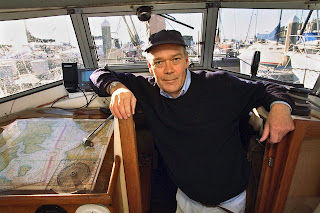Jonathan
Raban died last week. He was eighty –
not a bad run. He didn’t hit my radar
until Old Glory, but certainly other
people knew who he was already. He
resisted being called a travel writer; like Bruce Chatwin, he was somewhat sui generis, a writer of moods, and
weather, sudden storms and inner barometrics.
He wasn’t always the easiest guy to get along with, it’s said, but he
gave as good as he got.
Old Glory is
about a boat trip down the
This
bemused self-deprecation is of course a fiction, or a convenience, it wears out
its welcome – it’s maybe a Brit thing, too, that affectation – and Raban
discards it, later on. By the time of Passage to Juneau, eighteen years on, the
voice is no longer passive, and it’s fairly caustic, a burden of greater
self-awareness.
Somewhere
in the middle, he wrote the novel Foreign
Land and a memoir, Coasting,
which are back-to-back, and hold a mirror up to one another. Both books are about a sailing trip around
the coastline of
He called the lure of the open road (or the open water) a path to “escape, freedom, and solitude.” He seems to have had a less than joyful childhood, and his taking leave of things is a constant, one restless eye always tipped toward the horizon. I wish him, at the end, safe harbor.
